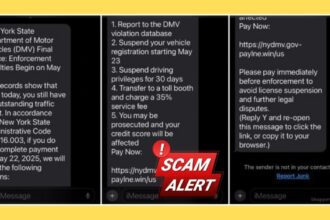Fraudsters leverage Latham & Watkins’ reputation in sophisticated impersonation schemes
In a troubling trend that has escalated over recent months, international scammers have orchestrated an elaborate fraud operation by impersonating attorneys from Latham & Watkins LLP, one of the world’s most prestigious law firms. These sophisticated scams have victimized individuals across multiple continents, with losses reportedly reaching into the tens of thousands of dollars for some victims. The schemes demonstrate an alarming level of sophistication in how cybercriminals are exploiting the credibility of established institutions to commit fraud.
Overview of the Latham and Watkins Impersonation Scam
The scam operation involves fraudsters posing as attorneys from Latham & Watkins, utilizing various communication channels including emails, phone calls, text messages, and social media platforms. The scammers have created convincing but fraudulent communications that mimic the firm’s professional appearance and tone, often incorporating the firm’s actual address, website information, and the names of real attorneys who work at the firm.
According to alerts issued by the Solicitors Regulation Authority (SRA) in the UK, these impersonation attempts have targeted both individuals and businesses across multiple countries. The fake communications typically create a false sense of urgency, authority, or opportunity to manipulate victims into transferring funds or sharing sensitive information.
“What makes these scams particularly effective is their ability to leverage the reputation of a globally recognized firm,” says cybersecurity expert Dianne Reynolds. “When people see the Latham & Watkins name, they automatically assign a level of trust and legitimacy to the communication.”
Diverse Methods of Operation
The impersonation schemes have demonstrated remarkable variety in their approaches, adapting to different potential victims and scenarios. The SRA and Latham & Watkins have identified several common variations:
1. Invoice Fraud
One of the most common approaches involves emails claiming to be from Latham & Watkins attorneys demanding payment for allegedly overdue invoices. In March 2025, the SRA issued a specific warning about emails misusing the name of Charles Armstrong, a Partner at Latham & Watkins (London) LLP, which included fake invoices with fraudulent bank information. Similar scams previously targeted another Latham & Watkins attorney, Jessica Walker.
2. Inheritance and Settlement Scams
Some victims have reported receiving communications claiming they are beneficiaries of unclaimed inheritances or financial settlements that Latham & Watkins is supposedly handling. These scams typically request advance fees to process the fictional inheritances or settlements, often requiring victims to prepare documentation such as marriage licenses or identification papers.
3. Tax Liability Threats
Another variation involves threats of litigation over alleged unpaid tax liabilities, with scammers demanding immediate payment to avoid legal consequences. These messages often contain official-looking documentation and create significant pressure through threats of court action or financial penalties.
4. Crypto Recovery Operations
Perhaps most insidious are the “recovery scams” targeting individuals who have previously lost money to other frauds. One Reddit user detailed how they were contacted by scammers claiming to represent the “International Federation of Lawyers” working with Latham & Watkins and a fictional “US Financial Crimes Enforcement Bureau.”
In this elaborate scheme, the victim was instructed to open an account with a fake online casino called “Grand Lisboa Casino” and deposit over $20,000, supposedly as part of a process to recover previously stolen funds. When the victim attempted to withdraw money, the fraudulent casino demanded an additional $15,000, revealing the multilayered scam.
Official Response from Latham & Watkins
Latham & Watkins has taken a proactive approach in addressing these impersonation scams. The firm has published explicit warnings on its website, confirming that neither the firm nor its attorneys have any involvement with these fraudulent communications.
“Latham & Watkins LLP, Latham & Watkins (London) LLP, our affiliates, and our lawyers have no involvement in these or any other scams,” states the firm’s official notice. “Names of our personnel are being used without our authorization.”
The firm has established a dedicated email address, [email protected], for individuals to verify the authenticity of any suspicious communications purporting to be from Latham & Watkins personnel.
The SRA has also issued multiple alerts about these scams, providing details about specific impersonation attempts and verifying that the genuine firm has confirmed having no connection to the fraudulent communications.
Identifying Fraudulent Communications
For potential targets, identifying these scams requires vigilance and awareness of several key authenticating factors:
1. Domain Verification
Legitimate communications from Latham & Watkins will only come from email addresses with the domain “@lw.com.” Scammers often use similar-looking domains such as “lwatkinsllp.com” or generic email providers like Gmail or Outlook with the attorney’s name incorporated. The SRA alert from March 2025 specifically identified fraudulent emails using domains like new.rr.com, adam.com.au, and earthlink.net.
2. Contact Information Authentication
The genuine Latham & Watkins (London) LLP has its head office at 99 Bishopsgate, London, EC2M 3XF, and its legitimate phone number is 020 7710 1000. Any communications providing different contact details should be treated with suspicion.
3. Official Verification Channels
Both Latham & Watkins and regulatory authorities like the SRA provide verification channels. The firm encourages recipients of suspicious communications to contact [email protected] directly to confirm authenticity, while the SRA can verify if individuals or firms are properly regulated and authorized.
Red Flags That Signal a Scam
Several common elements have emerged across these impersonation scams that can serve as warning signs:
1. Unusual Requests
Legitimate law firms would never request that clients open gambling accounts, make cryptocurrency transfers, or engage in unusual financial transactions as part of legal proceedings. The Reddit case involving instructions to open a casino account represents a clear example of this red flag.
2. Pressure Tactics
Scammers typically create artificial urgency, threatening immediate negative consequences such as litigation, property seizure, or loss of opportunity if the recipient doesn’t act quickly. This pressure is designed to override rational decision-making.
3. Grammatical Errors
While the more sophisticated scams may be well-crafted, many fraudulent communications contain grammatical errors, awkward phrasing, or formatting inconsistencies that would be uncharacteristic of communications from a top-tier international law firm.
4. Demands for Alternative Payment Methods
Requests for payment via wire transfers to unfamiliar accounts, cryptocurrency, gift cards, or other non-traditional payment methods are strong indicators of fraudulent activity.
5. Domain Age
In the Reddit case mentioned earlier, users noted that the fraudulent casino website (698fun.com) was only 29 days old when the scam was reported—a common characteristic of scam operations that frequently change their online identities to avoid detection.
Protecting Yourself from Impersonation Scams
Individuals and businesses can take several proactive steps to protect themselves from these sophisticated impersonation scams:
1. Verify Through Official Channels
Always independently verify communications claiming to be from law firms by contacting the firm directly through their official website or publicly listed phone numbers—not through contact information provided in the suspicious communication itself.
2. Be Skeptical of Unsolicited Contact
Legitimate law firms rarely initiate contact with individuals who are not already clients, especially regarding inheritances, settlements, or legal issues. Unsolicited communications should immediately raise suspicion.
3. Research Before Responding
Before engaging with any legal communication, research the firm and attorney through official bar association websites, the firm’s official website, or regulatory bodies like the SRA in the UK.
4. Never Share Sensitive Information Without Verification
Avoid providing personal, financial, or sensitive information in response to emails or calls until you have independently verified the legitimacy of the request.
5. Report Suspicious Activities
Report suspected scams to relevant authorities such as the Internet Crime Complaint Center (IC3), Federal Trade Commission (FTC), Commodity Futures Trading Commission (CFTC), Securities and Exchange Commission (SEC), or appropriate national authorities outside the US.
The Broader Implications
These sophisticated impersonation schemes targeting Latham & Watkins represent a concerning evolution in fraud tactics. By exploiting the reputation of established institutions, scammers create a veneer of legitimacy that can deceive even cautious individuals.
“What we’re seeing is a troubling sophistication in how scammers are adapting,” notes cybersecurity analyst Marcus Chen. “They’re no longer just sending out poorly written mass emails—they’re researching specific firms, learning about actual employees, and crafting targeted approaches that exploit institutional trust.”
For Latham & Watkins and other targeted firms, these scams create significant reputational challenges, requiring ongoing vigilance and proactive communication with the public. For individuals and businesses, they underscore the importance of verification procedures and healthy skepticism when dealing with unexpected communications, even from seemingly reputable sources.
As these scams continue to evolve, awareness, education, and verification remain the most effective defenses against falling victim to these increasingly sophisticated fraud operations.









































